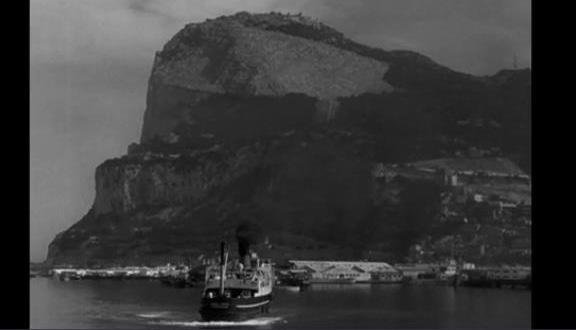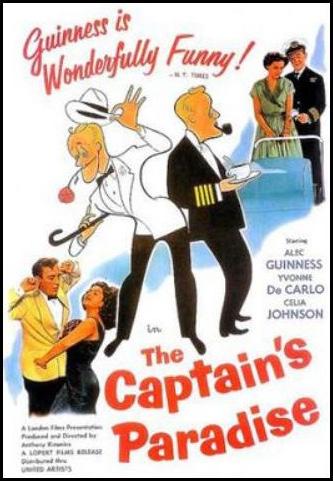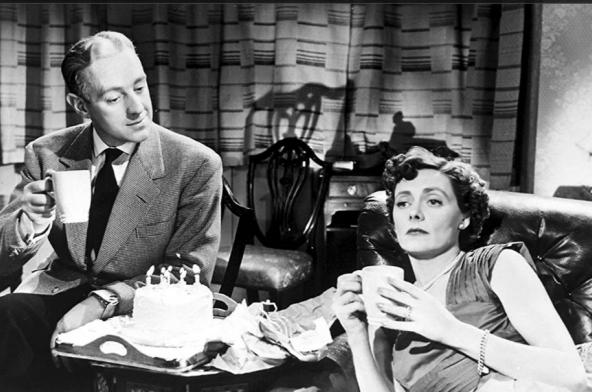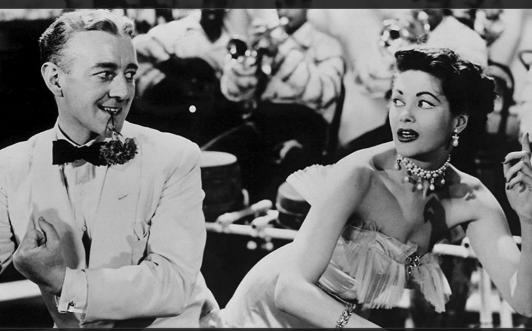
6 minute read
One Wife Too Many: The Captain’s Paradise
ONE WIFE
TOO MANY
‘A sailor with a girl in every port’ is an old expression much bandied about in bygone days by young men with visions of romantic life at sea. In the movie The Captain’s Paradise, the fantasy is switched to a captain with a wife in every port. Only two wives mind you, but that is still one more than allowed under British Common Law.
BY REG REYNOLDS
The Captain’s Paradise, released in 1953, starred Alec Guinness, Celia Johnson and Yvonne de Carlo. The black and white movie tells of the ‘paradise-like life’ of Captain Henry St. James (Guinness) owner and skipper of the passenger ferry The Golden Fleece that plies the waters between Gibraltar and Spanish Morocco. Captain St. James enjoys the advantage of having a staid, proper English wife, Maude (Johnson) in Gibraltar and a wild, nightlife loving second wife Nita (de Carlo) in Spanish Morocco.
I saw the film in the cinema when I was a youngster and watched it again recently via the internet. This fine British comedy is not full of belly laughs like a Carry On film or the slapstick of Laurel and Hardy but has plenty of subtle humour and interesting plot twists and turns. Many viewers will find the assumption of a man enjoying his egotistical self at the expense of two unsuspecting women offensive, but the writer Alec Coppel makes him pay for his devious behaviour. The story itself
He makes him pay for his devious behaviour.
is good enough that Coppel was nominated for an Oscar, losing out to Dalton Trumbo and Roman Holiday.
Gibraltarians of all ages will enjoy seeing various shots of the Rock and its docks. There are a few street scenes and one shot of a Saccone and Speed lorry, but unfortunately virtually nothing of the town. The flavour of Gibraltar life is enhanced with a considerable amount of Spanish dialogue. In the film the Moroccan town is called Kalik but looks to be Tangier, although one reviewer wrote that it was Ceuta.
The film opens with Captain St. James facing a firing squad. It develops slowly but the pace soon quickens and is quite entertaining until the surprise ending. Shortly after the opening scene, Lawrence St. James, played by Miles Malleson, arrives in Gibraltar hoping to visit with his nephew Henry only to find that he has disappeared. Lawrence meets with Carlos Ricco (Charles Goldner) the new captain of The Golden Fleece, who tells him of the rise and fall of Henry’s dual life in ‘paradise’. From there the film is a series of flashbacks with Ricco providing the narrative.
The Captain’s Paradise is a classic film of its era and was one of Yvonne de Carlo’s favourites. De Carlo, who was born Margaret Yvonne Middleton in Vancouver, Canada, had a tough early life. Her father abandoned the home when Yvonne was only three. Her mother worked as a waitress in order to survive and pay for Yvonne to take dance lessons. They moved to Hollywood where 15-year-old Yvonne performed as a dancer and an extra in films. Her breakthrough came in 1945 when she was signed by Universal Pictures to play Salome in the film Salome, Where She Danced. De Carlo had Sicilian ancestry
and with dark hair, blue/green eyes and a full figure often played Latino, Mediterranean or Hispanic women.
In an interview many years later De Carlo spoke of her early career: “I was thrilled to death with Salome because all of a sudden I was a star. I couldn’t believe it. Another film I remember very fondly was The Ten Commandments, which was a great experience for me in many ways. And I enjoyed the pictures I made with Peter Ustinov, Hotel Sahara, and Alec Guinness, The Captain’s Paradise.”
De Carlo’s early days as a professional dancer helped her considerably in Captain’s Paradise where she had several dancing scenes with Guinness, who despite his best efforts, is not convincing when he tries to impress as a loose-limbed playboy. During the filming de Carlo lived in London and one night partied with friends Grace Kelly and Ava Gardner and Gardner’s personal assistant. In her autobiography, Yvonne, she wrote:
“I’d studied flamenco, so I showed the girls some steps. That started it. Here we were, in the early hours of the quiet London morning, four slightly loaded young gals, wildly pounding our heels into the floor. We had great fun improvising and flailing around. The funniest scene of the predawn bacchanal was Grace Kelly’s solo. She was stomping, clapping her hands, a rose clenched between her teeth.”
By the time of the making of

The Captain’s Paradise, Guinness was already an established star through films like Kind Hearts and Coronets (1949) and The Lavender
Hill Mob (1951). He was nominated for an Oscar for the latter film and was voted the top British star of 1951. He went on to even greater fame with The Ladykillers (1955), won an Oscar for Bridge on the River Kwai (1957), and was knighted by Queen Elizabeth II in 1959. In his later years he gained recognition from a younger audience as Obi-Wan Kenobi in Star Wars, a role he detested. Guinness died on August 5, 2000, aged 86.
Celia Johnson was a popular leading lady when she signed for The Captain’s Paradise and was best known for her war-time films, In Which We Serve, The Happy Breed and Brief Encounter. After the war she married Peter Fleming, brother of James Bond creator Ian Fleming, and limited her acting in order to concentrate on raising their three children. In 1954 Johnson was nominated for a BAFTA (British Academy Film Awards) as Best British Actress for her performance as Maude, but she lost to Audrey Hepburn and Roman Holiday. She did win a BAFTA for Best Supporting Actress in The Prime of Miss Jean Brodie (1969) and was made a Dame in 1981. Celia Johnson was playing bridge at her home with friends when she suffered a stroke


in April 1986 and died a few days later aged 73.
Yvonne De Carlo never won any major awards but during her prime was celebrated as one of the most beautiful women in cinema, and she has two stars on the Hollywood Walk of Fame, one for movies and another for television. Like Guinness she gained a new generation of fans, in her case by portraying mother Lily in the popular television series The Munsters, and two spinoff films, Munsters, Go Home (1966) and The Munsters’ Revenge (1981). She died on January 8th, 2007 aged 84.
The Captains Paradise is available on DVD, and through internet movie sites, including the one I subscribe to - Kanopy. In the American version De Carlo’s character, Nita, is portrayed as Captain St. James’ mistress rather than his second wife.














